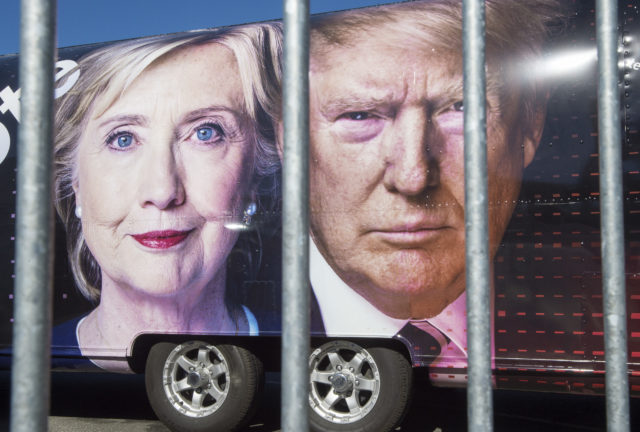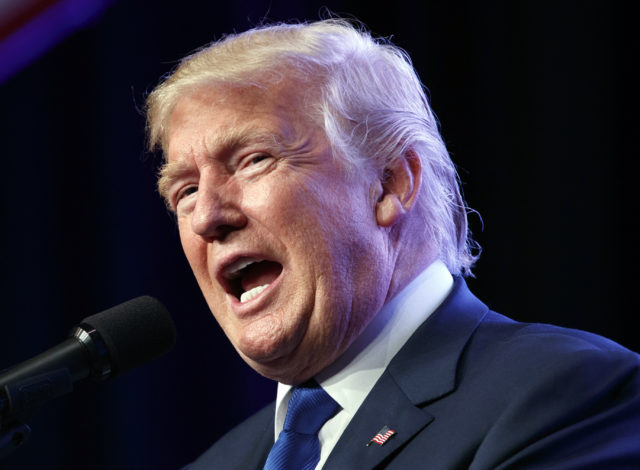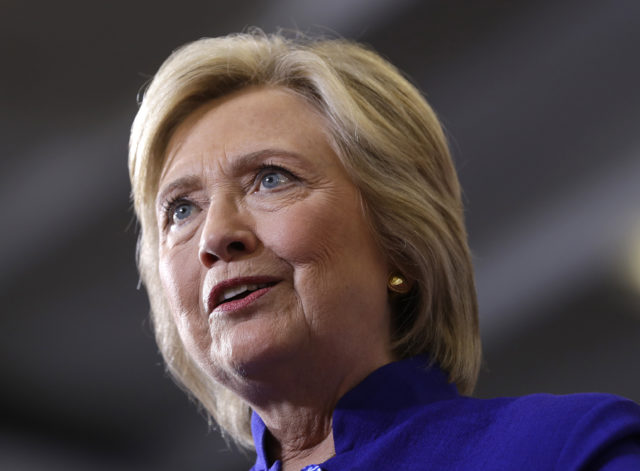
Large images of Democratic nominee Hillary Clinton and Republican nominee Donald Trump are seen on a CNN vehicle, behind a security fence, on Sept. 24, 2016, at Hofstra University, in Hempstead, New York, site of the first presidential debate on Sept. 26. (AFP)
After months on the campaign trail, making their cases on why they should be president — and why the other should not — Hillary Clinton and Donald Trump appear on the same stage for the first of three scheduled presidential debates.
Monday’s 90-minute question and answer session comes 43 days before Election Day, and at a time when the polls show a near-even race, with Clinton holding a two percentage point lead in the Real Clear Politics poll average
The three overarching themes for the debate — America’s Direction, Achieving Prosperity and Securing America — should highlight the deep policy disagreements between the two candidates.
But it is more than policy that will draw a record-breaking audience predicted to approach 100-million people. As James Fallows of The Atlantic notes, there’s drama and melodrama:
These debates would be must-watch TV because they would be the most extreme contrast of personal, intellectual, and political styles in America’s democratic history. Right brain versus left brain; gut versus any portion of the brain at all; impulse versus calculation; id versus superego; and of course man versus woman….Live sports, from the Olympics to the Kentucky Derby, differ from other TV programming and compel live viewership because no one knows beforehand how things will turn out. The same is true of live presidential debates, above all any including Donald Trump.

FILE – In this Sept. 16, 2016 file photo, Republican presidential candidate Donald Trump speaks during a campaign rally in Miami. The 2016 campaign for president reaches what may be a decisive milestone: the first debate between Hillary Clinton and Donald Trump. (AP)
Trump’s style versus Clinton’s substance can be strengths and Achilles’ heel for both candidates. Politico’s Glenn Thrush calls the debate the “first serious job interview for President Donald Trump.” In Time magazine, Pollster Frank Luntz has similar advice:
Before I get to specific language, let’s discuss tone. Whether they love you, hate you, or are still looking for a reason to vote for you, everyone wants to tune in to hear what you have to say. So as you walk on the stage, consider this: you do not need to shock with spectacle. You need to surprise with sincerity. Be the voice of the forgotten, hardworking taxpayer that has been ignored and betrayed by Washington. Allow me to be blunt: if you fall back on your old habits from the Republican debates and your off-script, off-the-cuff, off-the-rails personal insults from the campaign trail, you will alienate the cautious, concerned non-Republican voters you need.
Both campaigns are playing the “expectations game.” Usually, that means trying to trying to set a low bar for success so the candidate looks better afterward. That’s not the case in this debate. Trump’s campaign manager, Kellyanne Conway, called her boss “the Babe Ruth of debating,” likening him to baseball’s former home run king. Clinton’s running mate Tim Kaine said when the lights are bright, she brings “her A-game.”

In this photo taken Sept. 21, 2016, Democratic presidential candidate Hillary Clinton speaks during a campaign stop in Orlando, Fla. (AP)
Yet, there is a concern among Clinton supporters that Trump will be “graded on a curve,” because of his inexperience as a politician and his behavior on the campaign trail and in the Republican primary debates. Pat Garafolo writes in U.S. News & World Report the media is somewhat complicit in tilting the expectations in favor of Trump:
There’s reason to think this strategy will work for Trump, though, because during the whole campaign he has benefited from the soft bigotry of Trump expectations: The idea amongst the press that all it takes is one “pivot” and a few controversy-free moments to make him into a traditional candidate worthy of receiving votes. Each time he manages to go three days without insulting someone, praising a dictator or winking at violence being committed against Clinton, he wins praise for finally – finally! – acting “presidential.”
In essence, the media set a low bar, and then churn out hot takes when Trump barely hobbles over it….Clinton’s deep knowledge regarding politics and world affairs, along with her staid demeanor, gets held against her. She’s supposed to look like a competent candidate with real ideas, so she receives no credit for actually being one or having them.
Rich Lowry has a different perspective in Politico on how the low bar works for Trump:
Trump has a significant built-in advantage in that there is a lower standard for him — not because the media isn’t tough enough on him, as all the media mavens agree, but because he is the de facto challenger and candidate of change in a change election. Trump can win by clearing a bar of acceptability, whereas Clinton has to do more than that and either significantly wound Trump or make a compellingly positive case for herself that has so far eluded her in both 2008 and 2016.
Doyle McManus of the Los Angeles Times believes Clinton’s advantage in the polls will put pressure on Trump, although he will have an easier time achieving his debate goals:
Trump needs to show skeptical voters that he’s competent – that he can actually handle the job of president of the United States. Clinton must avoid unwinnable arguments about her honesty, and focus instead on how she would make voters’ lives better.
Never before have Americans had to choose between two candidates they dislike more. Much of that stems from the issue of honesty. Polls show neither are considered very honest, Clinton less so. Which brings us to the role of the third person on the debate stage: the moderator.
Lester Holt, television news anchor for NBC Nightly News, will be asking the questions. But is his job just to ask questions or should he be a fact-checker, especially for this pair of debaters? E.J. Dionne in The Washington Post says fact-checking will provide a needed service to viewers:
Holt and his colleagues Martha Raddatz, Anderson Cooper and Chris Wallace need to keep in mind that they are far more affluent than most of the people watching the debates. They should think hard about what life is like for those — from Appalachia to Compton, Calif., from the working class in Youngstown, Ohio, to the farm workers in Immokalee, Fla. — who find themselves in less comfortable circumstances than those at the media’s commanding heights.
WATCH: Former debate moderator Bob Schieffer delivers advice to this year’s debate moderators. From CBS/Face the Nation
In The Washington Times, Kelly Riddell says fact-checking is the candidates’ role, not the media’s:
On the Sunday morning news shows, Mrs. Clinton’s vice presidential pick Tim Kaine called fact-checking pivotal to the debate, her campaign manager said it was “unfair” for her to have to play “traffic cop” to Mr. Trump’s lies, while also having to articulate her vision for America…Translation: Help us media! Mrs. Clinton can’t do it alone, we need your help!
Despite what the Clinton campaign thinks, it’s not the moderators job to fact-checking on the spot — that’s the candidate’s role.
Which brings us back to Donald Trump and Hillary Clinton. There’s no shortage of advice for them from all corners of the blogosphere.
As to what Clinton needs to do, Jeet Heer in The New Republic raises Barack Obama’s first 2012 debate against Mitt Romney which most agree Obama lost. Heer suggests she remember that the debate is more political theater and less an intellectual exchange of ideas, and don’t get lost in the weeds:
As former Obama speechwriter Jon Favreau recalls, Obama went into the first debate with a chip on his shoulder. The president felt that Romney had been lying about Obama’s record and he wanted to set things straight. According to Favreau, Obama “kept asking for more policy briefings. He would speak in wonk and throw out acronyms during prep.” Clinton is by inclination just as much a policy wonk as Obama, and like him she’ll be inclined to be defensive about her record. So it’s imperative to look at the example of Obama’s second and third debates with Romney, where thanks to aids he had learned to avoid the detailed lectures that bogged him down the first time.
While wandering in the weeds could bog Clinton down, The New Yorker’s John Cassidy says she needs to remind viewers about her policy agenda:
It’s the same one that Democrats have been running on for twenty-five years, a period in which they have won the popular vote in five out of six Presidential elections, and it involves using the power of the government to tilt the economy in favor of working people. Trump, although he talks like a populist, has largely adopted the regressive economic policies of the Republican establishment.
Writing for The Hill, political analyst Bob Beckel says Clinton can use the “status quo” label to her advantage:
Her vast political experience and the depth of policy understanding that comes with it may in fact be a great asset particularly against a lightweight like Trump…
She should say, “Few people believe you can do what you say. Well Don, it’s time to be a man and tell the American voters exactly what you intend to do specifically…MAN UP DON.”

In this Sept. 23, 2016 photo, a student walks under a banner promoting the upcoming presidential debate on the campus of Hofstra University in Hempstead, N.Y. Hillary Clinton and Donald Trump will each take the debate stage on the campus for their highly-anticipated first face-off on Sept., 26. (AP)
The Washington Times’ Monica Crowley has a suggestion for Trump on how to turn Clinton’s policy knowledge against her:
She will try to swarm him with policy details to try to demonstrate that he’s unprepared for the highest office in the land. She’ll try to sit above the fray, winking that she’s “been there, done that.” Well, yes. But the question is not whether she was in the game. It’s how she played it — and what results she produced. For her, the result was evermore power and a net worth of over $125 million. For the country, the result is that we are less wealthy, less prosperous, less safe, less secure, less powerful.
Mr. Trump doesn’t have to show an encyclopedic knowledge of every policy nuance. He simply has to point to the wreckage of the Obama economy and foreign policy and say: “We tried it your way.”
Townhall columnist Mark Davis says Trump has to walk a fine line when it comes to the viewing audience:
Be aggressive but measured. Your existing fans will be there for you in November; the job tonight is to attract people who have been wondering about you and who are not thrilled with her.
The other audience you need to massage consists of steadfast constitutional conservatives.
Both candidates have been in the public’s eye for decades: Clinton as first lady, senator and secretary of state; Trump as real estate tycoon, pro football team owner, reality television star. After reaching out to various political consultants, The Atlantic’s Ron Brownstein writes that both need to address the unfavorability issue in order to win the debate:
The consistent note from these strategists in each party is that both candidates may benefit if they can suppress their natural instinct to maul their opponent and instead elevate other goals: in Clinton’s case proving that she cares about ordinary people, in Trump’s demonstrating that he’s fit for the Oval Office. Whether either candidate can follow that advice in the heat of Monday’s confrontation may provide an extreme test of the old wisdom that no plan of battle survives contact with the enemy.
Karl Rove, architect of the only Republican presidential campaign victories since 1992, has advice for Trump and Clinton in The Wall Street Journal:
Monday’s debate will feature a lot of back-and-forth between the candidates on policy. Mr. Trump cannot match the depth of Mrs. Clinton’s knowledge, but to appeal beyond his base he must avoid coming across as ignorant and shallow.
He should be careful not to overdo his attacks. Mr. Trump promises to keep questioning Mrs. Clinton’s fitness for the presidency by pushing on her email server, health, conflicts of interest with the Clinton Foundation, and record in office. But if he appears too aggressive, he could make her a sympathetic figure.
Mrs. Clinton, though a more accomplished debater, has a tougher task. Voters believe she has the experience, qualifications and temperament to do the job. But by emphasizing these traits, she underscores that she is the status quo….Mrs. Clinton must persuade Americans that she favors reasonable but far-reaching change and that her experience equips her to achieve it.

